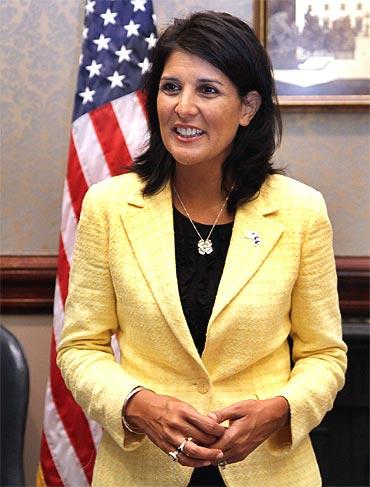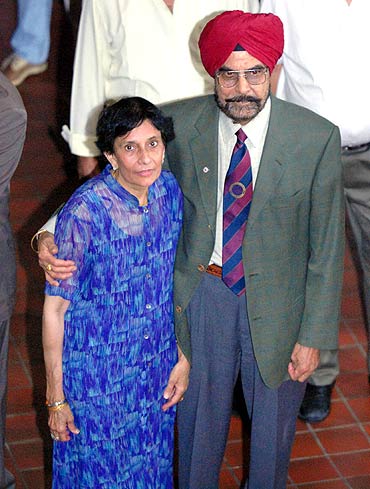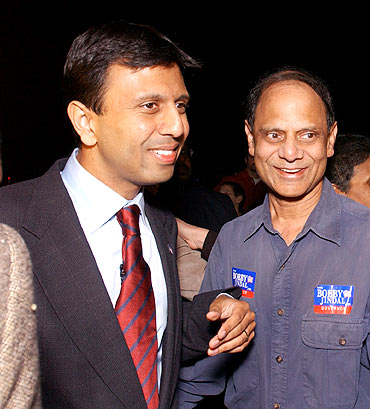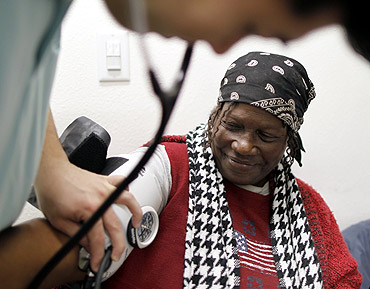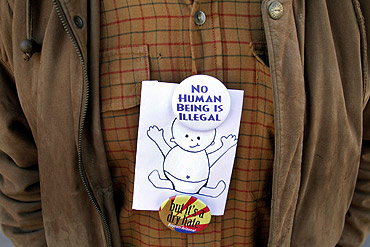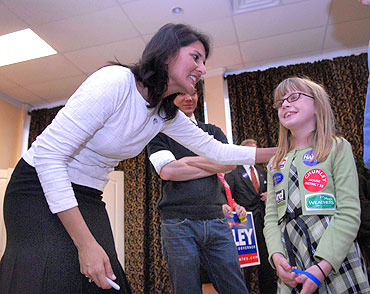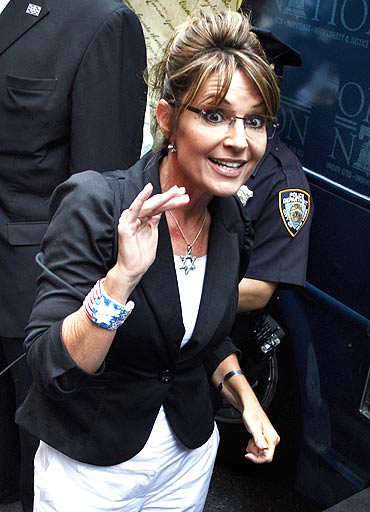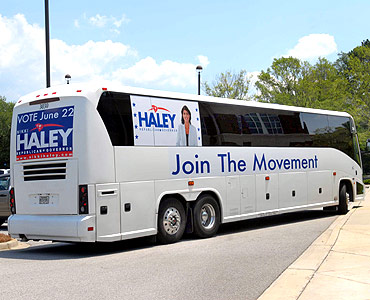 | « Back to article | Print this article |
Exclusive: Nikki Haley on her upcoming India trip
Read: Nikki Haley is India Abroad Person of the Year 2010
She has clearly proved that an Indian-American can be a game changer where race and gender are concerned. And now with a clear-eyed agenda for America, she's thinking of revisiting her roots. In October, she plans to visit India and her focus is clear. She has her eyes fixed on Indian companies -- to convince them to invest in South Carolina.
A daughter of Professor Ajit and Raj Randhawa, who have lived in South Carolina for nearly four decades, Haley's last trip to India was when she was two. Haley said she discussed her trip with Indian Ambassador Meera Shankar, who attended her inauguration ceremony in January.
Last month, Haley was adjudged the 2010 Person of the Year by India Abroad, the leading Indian American newspaper headquartered in New York that is owned by rediff.com.
In an exclusive interview with rediff.com the Indian-American governor talks about the purpose of her India visit, the 2012 presidential polls, her relation with Alaska Governor Sarah Palin, her strong objections to United States President Barack Obama's health care plans and more.
Click NEXT to read further...
Watch: 'I want to make the Indian community proud'
'I want people to know about the Indian American community'
It's been almost six months since you created history and became South Carolina's first woman governor, first Asian American, first Indian American chief executive of the state. You had to start working on your campaign agenda and priorities right from get go. But every often, during those quiet moments when you are alone or you are with family, do you reflect on this historic moment and let it all sink in?
I do, and it's overwhelming. I mean there are still times when I look at anniversary dates -- when we announced on May 14, 2009 my nomination for the governor of South Carolina and (former Alaska governor and Republican vice-presidential candidate) Sarah Palin came to offer her support. And, so you do go through all of those moments and remember the roller coaster and you remember the good and the bad times. But it's what motivates me; it keeps me focused that I have to prove to the people of South Carolina that they made the right decision.
You don't wear your race or ethnicity on your sleeve, but you haven't shied away from it either. You always speak of your immigrant roots, the hard work your parents put in, their pioneering spirit and the examples they set -- not to mention the values they inculcated. The campaign was pretty nasty and you had to take on this entrenched establishment and there were racial overtones, etc. But here was a constituency that obviously was above it and in fact were completely put off by all of the negativity and elected you quite convincingly. Does this say something about South Carolina and for that matter the country as a whole?
It says a lot about the country. First of all, I am so proud of my parents. My brothers and my sister know that we would not be where we are today had it not been for my parents. And they struggled so much more than we did.
My job is to make sure that we were positive, that we were strong -- that I said I was the proud daughter of Indian parents that reminded us every day how blessed we were to live in this country.
What you saw were the people of South Carolina and the people of this country embrace that American dream -- embrace the fact that we are a country of all races -- we are a country of different genders and cultures and everything and that's what makes this country great.
And, the fact that when Indians come here, they work very hard to give back what they have received. What I want people to know about the Indian American community is that they are the most educated, they make the most money per capita, they are the ones least dependent on government assistance. And the fact that I am most proud of -- they give more to charity than any other minority in the country. And I want the entire world to know that.
'Indian Americans have a lot to offer; the best way is to serve in office'
People from the East Coast and Washington say that there is a lot of negativity and racism in the south. Wasn't this all proven wrong when you were elected?
South Carolina is not the label that people have given. It is a very progressive state; it's a very smart state. It's a state that's very focused on policy. They don't judge people by race or gender, but on the impact they are going to have on the country.
I think they wanted everyone to see that they too are proud of the different cultures in South Carolina, and they are going to go with the person that best fits the needs of the state. I am incredibly proud of South Carolina.
Bobby Jindal being elected earlier in Louisiana and you being elected in South Carolina, what does it about the Indian Americans running for political office? You've been a role model, particularly for Indian American women, aspiring for political office and public service and you've been in fact, encouraging them to run for office and run very aggressively?
It's time to step up. Our parents sacrificed so much for us to be at this place and it's now up to our generation to step up and say, 'OK, we are great in business, we are great in medicine, we are great in education, we are great in research, why can't we be great in politics?'
We have a lot to offer and the Indian Americans should realise that one of the best ways to serve your country is to serve in elected office.
'We need to get maximum health care at minimum cost'
You were among the newly elected governors who met US President Barack Obama just weeks after being sworn into office. You had no compunctions in expressing your strong reservations and concerns about his health care reform bill. Will you continue to try to overturn it in South Carolina even though there was all this criticism that yes, you've spoken out against it, but you had no compunctions in accepting federal money?
Well, first of all, the previous administration accepted federal money. I did not. But what I would tell you is we have to look at our states and ask 'How do we get the most health care for the least amount of money?'
And, I will tell you mandatory health care is not the way to do it. What we need to focus on is the fact that Americans have
divorced themselves from the cost of health care. We now go and get procedures done without asking the cost. We do it because the doctor tells us to. And what we know is, 30 per cent of those processes are not needed.
If we suddenly saw the cost of these actions, we would start to become more responsible in our decisions. What I want to see is more transparency between the patient and the doctor and the doctor and the insurance company. This is a great conversation about health care in America. But what we need is have as many private options as possible and allow the consumer to be able to choose which options are best for them.
And, should tort reforms (proposed changes in the civil justice system that would reduce tort litigation or damages) be an integral part of any health care reform bill?
Absolutely. When you look at frivolous lawsuits, when you look at the fact that doctors don't give you those five tests because they want to, they give them to you because of the three per cent chance that they could be sued it raises the cost of health care. Tort reform has to be a strong part of that.
'Problems of illegal immigrants because Obama hasn't secured borders'
We need to do two things. One, I know that this country is a country of immigrants, but it's also a country of laws. When we give up being a country of laws, we give up everything this country was founded on.
My parents came here legally. They put in the time, they put in the money. It's offensive to them when people come here and don't go through the proper procedures. What we want is to make sure that everyone that's here, is here legally.
Secondly, we need to expand the worker visa programme so that we have options for people to come here legally and still do the work that we need for them to do. It's got to be a two-sided approach. It's not that we don't want immigrants here. We just want to make sure that they follow the laws so that we can maintain the integrity we have.
And, do you think that this has got to be a comprehensive immigration bill or are you in of favour of Senator Orrin Hatch (Utah Republican) talks about the fact that we need professionals. So, maybe, we need to separate H-1B Bill, maybe we also got to clear these backlogs of green cards. When you lump all of it into a comprehensive immigration bill, many times nothing gets done?
We need to understand that the reason we are dealing with illegal immigration is because the President has not secured the borders. It has become very dangerous and we are now dealing with the drug and gang problem that's dangerous to all of us. What we do need is professionals.
We do need workers that we can't find in this country. That's the reason you expand the worker visa programme. That's the key to making sure that we get who we need.
Yes, we need more professionals, we need more researchers, we need more engineers and we need more help. But we need to make sure that the worker visa programme is a good one, so that we can bring them over easily and we know exactly who's documented and who's not.
'I won't run for VP, my job is to make South Carolina proud'
On your interview with Christiane Amanpour on ABC's This Week you made it very clear that you are not interested in running for the 2012 Republican vice president's post. But if the senior Republicans, the party and the presidential nominee request you to contest will you still turn it down?
Yes, I will. I have committed to the people of South Carolina to do the best job that I can. The best thing I could do is be a great governor. The best thing I could do is talk about issues on a state level that are being pushed down from the federal government. That's what I could do. That's the way I can help by continuing to talk about the labour unions, mandatory health care and spending that's out of control. The state took a chance on me. I need to finish my commitment to them.
So, one more shot no wiggle room no waffling, nothing on this issue?
None, none. My job is to make the people of South Carolina proud.
'I may not necessarily support Sarah Palin'
I don't have a candidate of my choice yet. I am going to listen to all the candidates. This is going to be the best policy discussion we've ever seen during presidential elections. Though various policies related to health care and jobs President Obama has said that the US is going to push its choices on people as opposed to allowing them to make decisions for themselves.
I am looking at Republican candidates and their stand on government spending when it's out of control. I want to know where they stand on the labour union fight, when unions bully our states and tell our businesses what they can and can't do. I want to know where he stands on energy independence when gas prices are high. So, I am going to look at all of these issues, look at the candidates, look at what the president's reaction is.
Even if Governor Palin jumps in, you won't endorse her?
No. I owe more to the country to make sure that we look at all the issues. I am a great fan of Governor Palin and she was very good to me at a time when I needed it. But I think even she would expect me to go and look at the issues and look at the candidates and see what it best.
'Temphasis on the India trip is to brihe
Meera Shankar invited you to India and you are thinking of perhaps a trip to India sometime in October. Have schedules been worked on and will you lead a high-powered trade delegation because India is just galloping in terms of the economy, setting up a lot of businesses in the US, etc. And, there's always the chance that it can bring a lot of jobs, generate a lot of employment in South Carolina.
First of all, I met Shankar during my inauguration and was excited to have her here. I also met her at her home and I was so excited we talked about a trip to India. I would love to go. I haven't been to India since I was two years old and so I certainly want to go. But more importantly, there are great Indian companies that are now looking to invest in the United States and I want them to invest in South Carolina.
We are a great state; great pro-business state. The cost of doing business in South Carolina is low, our trained work force is great. We keep the unions out so a lot of companies want to come to the state and invest in aerospace, automotive, research and development. So, I am heavily recruiting. Since I've taken office, we've brought 7,000 jobs. The unemployment number is down for the fourth time in a row. Exports are up, tourism is up and it would only make sense that we go to India and say, 'We want you here, we welcome you here, please come to South Carolina.'
So, you will be taking a very high-powered trade delegation with you?
Absolutely, with the whole emphasis of trying to see how much trade we can bring to the United States.
